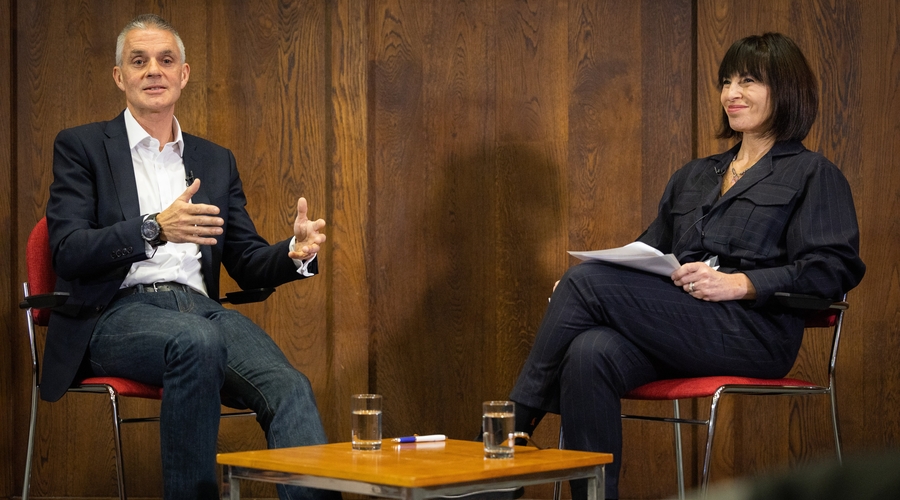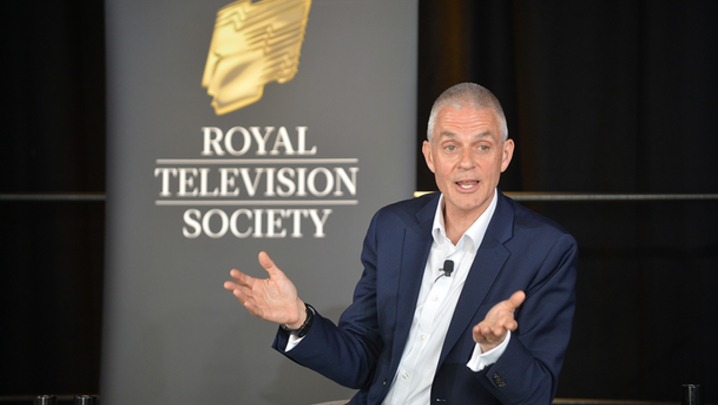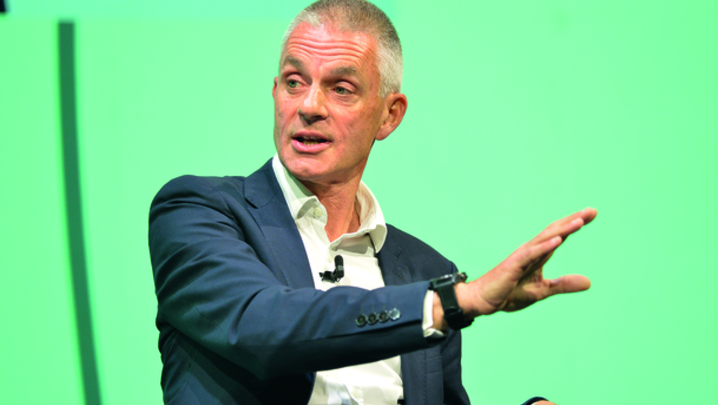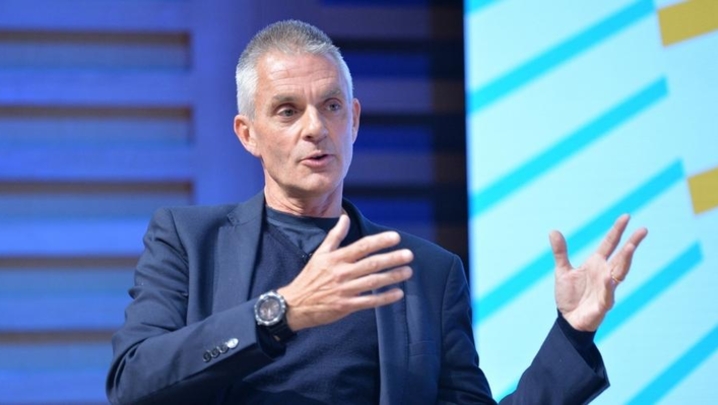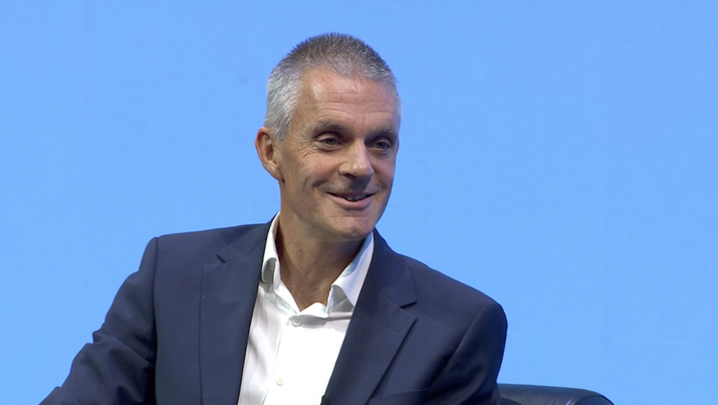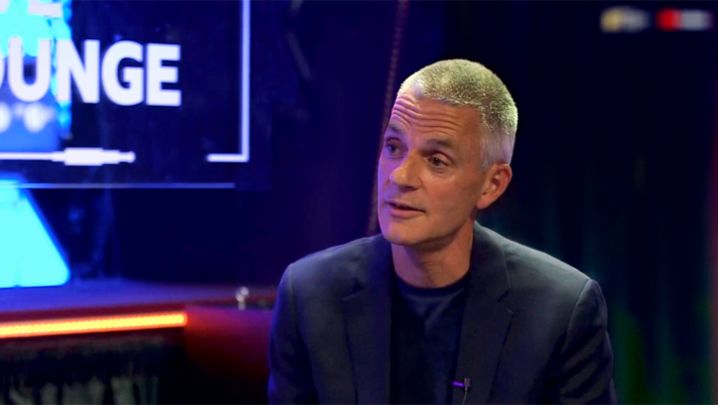BBC Director-General Tim Davie outlines the action he wants to see to future-proof UK media entering an all-online era
Tim Davie, the BBC’s Director-General, has called for urgent action to ensure that British media can prosper into the 2030s. He said the BBC must work together with politicians, policymakers, regulators, and other parts of the sector to secure the future of a world-leading UK media market.
He was speaking at an RTS event attended by the former BBC Director-General John Birt, academics and BBC Chair Richard Sharp, who recently claimed the corporation was guilty of “liberal bias”, which it was fighting against. Davie made an impassioned case for why a newly capitalised BBC should be at the centre of a thriving domestic media characterised by “public service growth”.
He said: “Today, I want to make a case for growth, and the choices, as the UK, to own it. Too much of this debate is painfully ‘small’.
“In BBC terms, we understandably fret about domestic issues, political spats and the latest headlines. And, because people care, we keep busy on a joyous treadmill of flare-ups and debates.
“But, beyond the day-to-day, we urgently need to spend more time agreeing what we want to create that best serves our audiences, the economy and society.” The aim should be “to create a bigger creative sector supported by strong public service media and a thriving BBC”.

To achieve this, he identified four essential requirements:
- Ensure that the UK is fully connected so that everyone can receive their TV and radio via the internet. A positive plan is needed to ensure that UK businesses and audiences get maximum benefit, no one is left behind, and content remains universal and affordable – and not at the behest of rich, overseas companies acting as gatekeepers.
- Champion a clear, market-leading role for the BBC in the digital age. No one in the world has created a digitally led public service media company at scale. There is an opportunity to put the BBC at the heart of the UK’s media future. There is a plan for how an internet-only version of the BBC will operate, focused around a simple, single brand in the UK and abroad, the BBC.
- Invest in the BBC. The BBC is one of the world’s most powerful and recognised brands. “We are open-minded about future funding mechanics, but we are clear that it is critical we have a universal solution that fuels UK public service growth – not stifles it – while offering audiences outstanding value for money.”
- Move faster to regulate for future success. “The UK’s legal and regulatory environment has not kept pace with the market. We need rules for the prominence, availability and inclusion of PSB content on new platforms, in video and audio.” And “a regulatory framework that is proactive, agile, and responds to obvious harm when it occurs – allowing innovation and growth across the industry, alongside the necessary and appropriate safeguards.
“Today, the BBC reaches nearly half a billion people weekly, a number that has been growing.”
The corporation is “the best-known British cultural export – that’s quite something, when you consider the competition, from music to monarchy”. In India, BBC services reach 70 million people in nine local languages. In the US, the BBC is now the most trusted news brand. When BBC News’s Russia editor, Steve Rosenberg, interviewed that country’s Minister of Foreign Affairs, Sergei Lavrov, the recording received “7 million views inside Russia”.
Despite this, Davie said, “We are in a period of real jeopardy. A life-threatening challenge to our local media and the cultural and social benefits it provides.”
"The BBC remains bigger than Netflix, Amazon and Disney+ combined for hours of video watched [here]"
This is not an immediate crisis for audiences: “The choice of high-quality TV and audio has never been better. The threat is not about whether there is choice, it is about the scope of future choice and what factors shape it. Do we want a US-style media market, or do we want to fight to grow something different, based on our vision?”
Broadcasting, as opposed to streaming, will continue to shrink as a proportion of people’s TV and radio consumption across all age groups. TikTok is now bigger than the BBC in video for 16-24s in the UK. Today, he said, is the right time to ask: do we let the global market simply take its course or should we intervene to shape the UK market?
Nearly 90% of adults, and 75% of 16-34s use the BBC every week; and every month, nearly every adult uses the BBC in the UK. “More than 30 million browsers in the UK used the BBC online yesterday, the only online UK brand to really mix it with global players,” Davie stressed. “When it comes to hours of video watched in the UK, the BBC remains bigger than Netflix, Amazon Prime and Disney+ combined.”
Award-winning shows, from Time to Motherland, have proliferated: “Nine million watched the launch of Frozen Planet II, while a peak audience of 17 million watched the Women’s Euros final; the BBC delivered 42 million streams of Glastonbury; and the coverage of Queen Elizabeth II’s funeral showed what only the BBC can do.”
The numbers of people who say the BBC provides impartial news has held firm. “BBC Studios has grown rapidly over the past five years, delivering a stretching target of more than £1.2bn in returns and growing profits 70%,” said Davie.
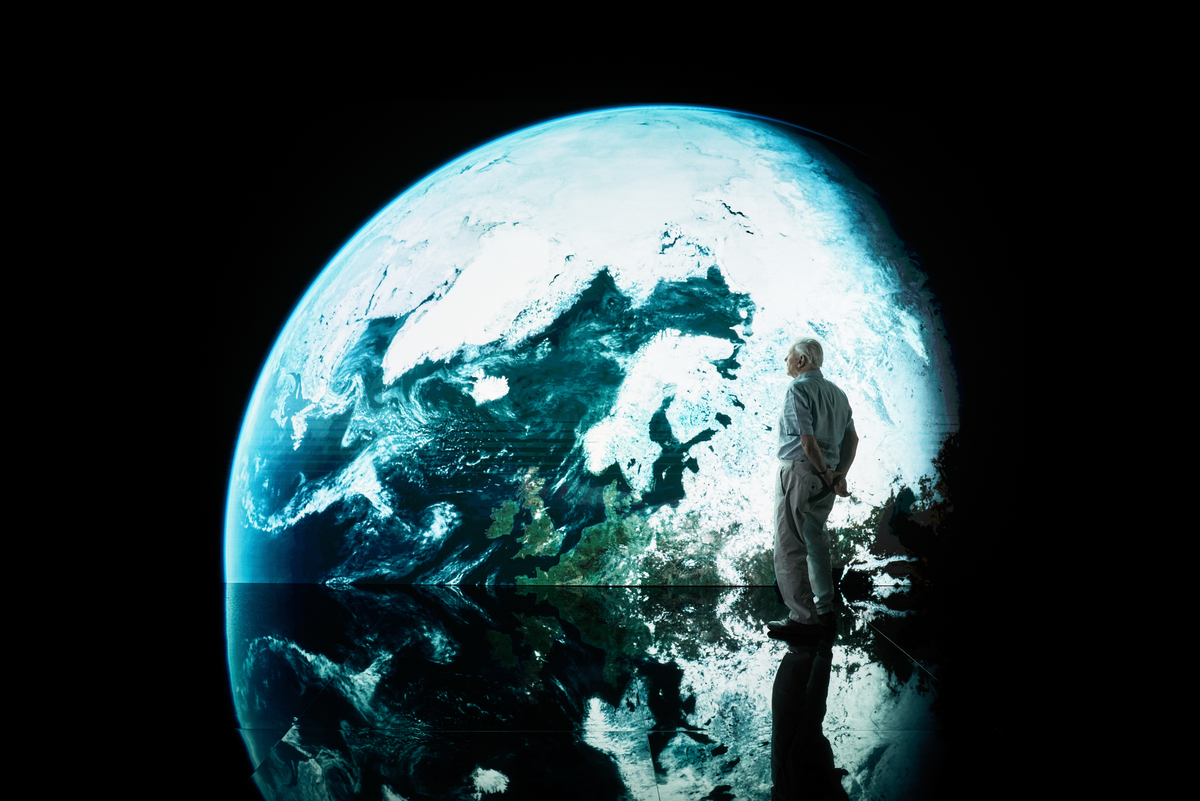
At the same time, the corporation has stepped up its commitment to a highly efficient BBC, reducing overheads to within 5% of total costs. “We cut more than 1,000 public service roles last year. All our senior managers are assessed, and we are stripping away bureaucracy as we create a world-class culture,” Davie continued.
He said the time when the broadcast signal will be switched off, bringing “infinite choice”, is not that far away; the BBC needs to start planning for this now.
In this online-only world, the BBC will have an opportunity to harness the potential of an interactive digital landscape to increase public value and stimulate the UK media market. Internet-only distribution will represent a chance to connect more deeply with audiences and to provide them with better services and choice than broadcast has allowed. There will be significant editorial opportunities.
He urged the Government to speed up broadband roll-out. Forecasts suggest that, by 2030, about 2 million UK homes will still not be using fixed-line broadband; and, even in a few years, 5% of the UK landmass may not be covered by 5G or 4G to provide content on the move.
In this digital future, the BBC will provide universally delivered, differentiated content and nurture an informed society through impartial, trusted news and information. “Over time,” he said, “this will mean fewer linear-TV broadcast services and a more tailored, joined-up online offer.
"We are open-minded about a future funding mechanism [but it must] fuel public service growth"
“As examples, we will double down on the latest work in BBC News on disinformation and accelerate the drive to ensure that network drama is sourced from across the UK, which differentiates us from others.”
Davie emphasised: “In the future, we will need to transform the BBC faster to deliver a compelling online offer.
“We are working on how an IP [internet protocol] BBC could be the best version of the BBC, shaped around people’s interests and needs. A daily partner to your life, bringing the BBC together in a single offer with personalised combinations. A world in which local news, areas of interest and hidden gems can be found more easily… imagine news reimagined for iPlayer.”
The BBC will be a world-leading pioneer in this. “No one in the world has created a digitally led public service media company of scale, and the global opportunity for us is there for the taking,” Davie predicted.
To achieve this will require significant change: “We will have fewer brands overall, and consolidate actively behind a simple, single brand in the UK – the BBC. You’ll see this globally, as well. We will also simplify sub-brands such as BBC News. You can see a first step in our bringing together of the BBC News Channel and BBC World News as one brand: BBC News.”
The BBC will require investment to achieve this: “Any transition of a legacy broadcast organisation to a digital future needs capital. As the owners of even the biggest companies are finding out, it is not for the faint-hearted. Moving to digital is not the challenge in and of itself: moving to digital while not losing most of your audience and burning millions of pounds unnecessarily is the challenge.”
The DG added: “As we look to the 2030s, we are open-minded about a future funding mechanism. But we are clear that it is critical that we need a universal solution that fuels UK public service growth, not stifles it, while offering audiences outstanding value for money.
“Of course, the latest settlement did include the increased debt facility for BBC Studios, which was welcome, and we are ambitious about its prospects. Alongside commercial plans, we will keep cutting costs to invest and attract more partner investment, such as the latest deal we announced with Disney on Doctor Who. [Even] under the most ambitious scenarios, this will not change the need for serious public service investment.”
More money will be required for the World Service to avoid further cuts at a time when “the Russians and Chinese are investing hundreds of millions in state-backed services”.
Lastly, Davie said, “We need to regulate for success at speed.” The Digital Markets Act plus the Online Safety Bill, Data Protection and Digital Information Bill and Media Bill, planned for this Parliament, were all essential legislative changes. “We need a regulatory framework that is proactive. It must be agile – able to respond without endless consultation and process. I am pleased that Ofcom is working in this area.”
Report by Steve Clarke. Tim Davie spoke to the RTS at St Martin-in-the-Fields, London, on 7 December. The Q&A session was chaired by RTS CEO Theresa Wise.
Question & answer
Q: Theresa Wise: What would an internet-only BBC look like?
A: Tim Davie: Live linear-TV is here for the long term. The online BBC is not trying to replicate Netflix or Spotify…
We’ve got to get an algorithm where you get the right degree of personalisation. But I want to know what the BBC newsroom thinks the main story is and not be wholly driven by algorithms.
Regarding funding, you’ve got a flat licence-fee settlement and huge media inflation. I don’t know if that means you will have to do less in an internet world?
Well, it’s tough. You can look at it through different lenses. We’re privileged to have the certainty of the licence fee until 2027-28 – two years flat, four years of CPI. There are commercial businesses that would sign off on that in terms of the overall revenue of the core business.
But there is no doubt that there are enormous pressures. Obviously, there’s inflation. The market’s booming, which is driving up prices. Critically, our competitors are putting up their prices…
Our job at the BBC is not simply to get the licence fee – or whatever the funding mechanism is – up, but to offer great value.
Is your preferred funding model the German-style ‘household levy’ that [BBC Chair] Richard Sharp referred to in his recent interview in The Sunday Times?
Beyond 2027-28, we need to be open. But we need to be very clear about the principles and we need a mechanic that delivers against those principles. These include universality and independence from political interference on a day-to-day basis. That’s sacrosanct and non-negotiable.
It’s utterly critical to us that we can report without fear or favour. We make hard choices around impartiality. That’s non-negotiable…
The funding mechanism has to offer fair value to all audiences, and sustainable funding.
How big is the risk that US-based companies will end up dominating the UK media landscape?
We’re not there to beat Netflix. I like and respect these companies. We are not going to have everyone’s media time. Some of the debate about so-called young people’s media time is ridiculous; I am quite happy if somebody spends a lot of their time gaming, so long as they spend enough time with the BBC.
In the future, I’m thinking we could be providing BBC News in games. I see us working alongside these companies. My speech was not about restricting their ability to operate, it was about intervening on behalf of the UK and protecting our IP.
There is a difference between having studio facilities and owning IP.
How much IP does the UK own? Who owns the IP is a bigger question than who’s operating the most effective shed. Those sheds are brilliant at delivering jobs, skills and apprenticeships but they are not going to underpin the creative industry. It’s about who owns the IP.
Angela Ferreira, MD, Douglas Road Productions (speaking from the floor): Over the years, the BBC has cut or vastly reduced the Community Programmes Unit, the Disability Programmes Unit, the Asian Programmes Unit, the African and Caribbean Unit, along with the lack of original commissioning for BBC Four and, recently, the cuts to local radio, particularly in the evening. How will some of those underserved audiences be served in the future?
I’m very proud of our record in terms of how we commission from a very diverse base, much more than any commercial organisation.
Regarding local radio, we are in consultation and, as a result of that consultation, I don’t want to see big reductions in the areas we are talking about.… Look at the special funds we’ve put into investing in different kinds of content run by diverse leaders…
You have to look at the core output, the core drama and major strands, and who is making them. That is when we’ll know if we’re a more diverse, inclusive broadcaster…
Bluntly, the BBC Four issue is about funding. It’s not designed to affect minority audiences. Everyone is equally affected by that.

